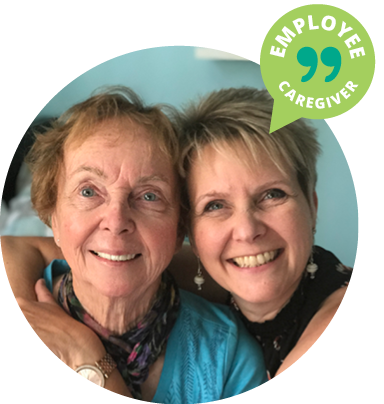Jacquie Eales,
caring for her mother
I have a lifelong interest in helping others. Akin to being a ‘good’ daughter, granddaughter, partner, coworker or neighbour, I tend to watch out for others and help whoever is in need. I supported my mom as she cared for her parents and her second husband through the end of their lives. I supported my husband’s father through his cancer journey, and his grandmother through her old age, ensuring that she felt connected to her family and community. I also cared for my husband when he had a full knee replacement. Looking back, I guess I am a caregiver.
I know firsthand that caregiving is more than providing or coordinating a bunch of tasks. Caregiving is about linked lives and personal relationships with others. It’s complicated, messy and emotional. How it looks depends on who you are caring for and the nature of the care they need. I’ve been fortunate to work part time for the past 20 years, which gave me the flexibility I needed to raise my four children, care for my loved ones and have meaningful work in the paid labour force.
I’ve reached a time in my life where my children are grown and I should be maximizing my pensionable earnings by working full-time. Yet my husband and I have decided that I should work even fewer hours for pay so that we can better support our moms (now in their 80s and living nearby) while maintaining our own well-being. We are fortunate that we can afford to proactively make this choice because I know many caregivers cannot. Financial hardship arising from reduced hours of work and job loss are realities that some caregivers face.
I am grateful to have the support from my employer to further reduce my hours of paid work and choose when and where I work to better integrate work and care in my life. My boss has been a caregiver in her own life and was very understanding and accommodating. With 30–35% of the Canadian workforce having caregiving responsibilities, I wish that more caregivers had supportive supervisors and employers. People want to work in environments that value employee well-being by providing support and flexibility when employees need it most.

“I should be maximizing my pensionable earnings by working full-time, yet I’ve chosen to work even fewer hours for pay to support our family without jeopardizing my well-being.”

“I should be maximizing my pensionable earnings by working full-time, yet I’ve chosen to work even fewer hours for pay to support our family without jeopardizing my well-being.”
Jacquie Eales,
caring for her mother
I have a lifelong interest in helping others. Akin to being a ‘good’ daughter, granddaughter, partner, coworker or neighbour, I tend to watch out for others and help whoever is in need. I supported my mom as she cared for her parents and her second husband through the end of their lives. I supported my husband’s father through his cancer journey, and his grandmother through her old age, ensuring that she felt connected to her family and community. I also cared for my husband when he had a full knee replacement. Looking back, I guess I am a caregiver.
I know firsthand that caregiving is more than providing or coordinating a bunch of tasks. Caregiving is about linked lives and personal relationships with others. It’s complicated, messy and emotional. How it looks depends on who you are caring for and the nature of the care they need. I’ve been fortunate to work part time for the past 20 years, which gave me the flexibility I needed to raise my four children, care for my loved ones and have meaningful work in the paid labour force.
I’ve reached a time in my life where my children are grown and I should be maximizing my pensionable earnings by working full-time. Yet my husband and I have decided that I should work even fewer hours for pay so that we can better support our moms (now in their 80s and living nearby) while maintaining our own well-being. We are fortunate that we can afford to proactively make this choice because I know many caregivers cannot. Financial hardship arising from reduced hours of work and job loss are realities that some caregivers face.
I am grateful to have the support from my employer to further reduce my hours of paid work and choose when and where I work to better integrate work and care in my life. My boss has been a caregiver in her own life and was very understanding and accommodating. With 30–35% of the Canadian workforce having caregiving responsibilities, I wish that more caregivers had supportive supervisors and employers. People want to work in environments that value employee well-being by providing support and flexibility when employees need it most.

